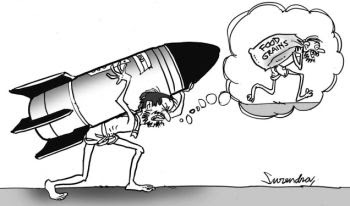Sunday, Sep 26, 2010
Our children die almost in their thousands daily. Hardly 50 km away from India's commercial capital city of Mumbai, children die every day of starvation in a small Adivasi village of Jamsar. Farmers in many States are committing suicide, thanks to our new economic policies formulated by some of the top “professors” from the London School and Harvard. Our present policies could only be termed richonomics — economics of the rich, by the rich and for the rich. While funds are flowing like water for building SEZs, malls, and highways and byways, they have no resources to build food storage warehouses! That is not a priority in their economic policy which works on the principle of “He who hath, shall be given.”
The rich have become richer and they are also immune to many of the societal rules that govern the poor. The gap between the haves and the have-nots has not only widened, the purchasing capacity of the poor has gone down significantly. While the new industrial tycoons get all kinds of incentives, the poor farmer has to pay through the nose for his daily needs with the ever-decreasing market value of his produce.
Poverty, in addition, is a double-edged weapon. While poverty is the womb of disease, the poor are also robbed of their daily wage earning when they fall ill. The result is that they pay for their poverty with their own lives.
This is so in every other sector government by the principle richonomics and corporate hospitals are no exception. “Health Insurance,” the failed American model which many of our powers-that-be think is a great solution, only adds to the woes of the hapless, poor patients. Once the hospital realises that the bakra (the patient) has insurance cover, it uses all its gadgets to get the best possible diagnosis, the latter in itself has become a disease.
I was once an arbitrator between a philanthrope who had insured his whole village at a very hefty premium. Most of the claims made the following year were rejected by the company. It was my thankless job to try and find out if the rejections were legal and ethical. In one case, a poor farmer had a small nick in the skin of the foot caused by the plough. When he went to hospital, it realised that he was insured. He was promptly admitted there and all the tests were carried out on him, ranging from urine analysis to ECG, echo, etc. Then he was taken to the theatre for skin grafting. The insurance company branch manager, who happened to be a trained vet in his previous avatar, rejected the whole claim saying that a skin graft is never done for a fresh small wound! Rightly so.
Had the farmer kept quiet, the wound, in most cases, would have healed in a week with some conventional old granny's methods. Maximum, he might have needed a tetanus shot. Even that is of dubious value, according to the present science. This is only the tip of the iceberg as the hospital in question was in a rural area and it did not have any other facility. In a larger corporate hospital, the patient would have ended up undergoing a bypass surgery, as most normal people have coronary artery blocks which keep them healthy. A rare person who does not have a block is given some method to create a block to keep him alive — preconditioning the heart muscle!
We get our advisers from Oxbridge and Harvard but not from our Indian villages. We have Nobel laureates to advise us when we have people like Manusukhbhai Prajapathi in a Gujarat village, who has innovated a refrigerator without electricity (mitti cool), pressure cooker, non-stick thava, water filter and, many other household tools in his own home laboratory, after failing to make the grade at class X, only with clay, coming as he does from a potter's family. He is being honoured in all countries abroad and his tools are sold all over but he is not encouraged by our richonomics experts. This village boy should get his Nobel and what have you. He is the best candidate to head our CSIR. Who cares, though?
None of our big laboratories has done any innovative research to date. That very much applies to medical research organisations. They could effectively block good research using their powerful tool of peer review and linear thinking. Prajapathi has taken knowledge forward in science and even in technology. Karl Popper would have been too happy to know Prajapathi as he was sure that “knowledge advances NOT by repeating known facts but by REFUTING false dogmas.”
Our time-honoured economic policies would suffice. Competing with the West to send man to the moon can wait till we are able to feed all our mouths with three square meals a day, provide a roof in place of the star-lit sky, a toilet with sanitary facilities, drinking water and education for the kids and economic empowerment of village women. The rest of the progress will follow in their wake. India will not progress with missiles and rockets. It will progress with healthy and happy Indians who are able to go to their neighbour's house with a smile in their face instead of trying to go to the moon. A healthy India will be a strong and happy India.
(The writer is a former professor of cardiology, Middlesex Hospital Medical School, University of London, and retired Vice-Chancellor, Manipal University. Email: hegdebm@gmail.com)

